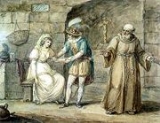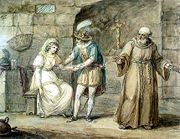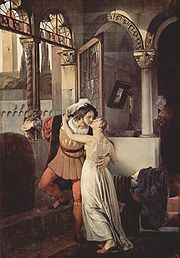
Romeo und Julie
Encyclopedia
Romeo und Julie is a singspiel
in three acts by composer Georg Benda
. The opera
has a German libretto
by Friedrich Wilhelm Gotter
that is based upon Christian Felix Weiße
's translation of William Shakespeare
's play Romeo and Juliet
.
Gotter's libretto eliminates many of Shakespeare's characters and most of the original plays comedic elements. It does, however, adhere to unities of time and place. Gotter's text, also makes Julie
the strongest and most important character in the opera, which is further reflected in Benda's score. Perhaps the most notable change Gotter made was the addition of a lieto fine at the end. In accordance with operatic tradition at that time, Gotter gave his version of Romeo and Juliet a happy ending.
, Germany. The UK première was given in 2007 by Bampton Classical Opera
, in English.

 Deep rivalry and animosity exists between the Montagues and the Capulets, two noble families of Verona. Romeo Montague sneaks into the Capulet's palace to attend their masked ball in disguise. He meets Julie Capulet and the two fall in love. They decide to get married in the hopes that it will bring the family feud to an end. Friar Laurence, the Capulet family chaplain, marries them in secret. Soon after the wedding a street brawl results in the murder of Romeo’s friend Mercutio. Angry, Romeo attacks and kills his murderer, Tybalt Capulet who is Julie’s cousin. Romeo is banished to Mantua by the Duke of Verona.
Deep rivalry and animosity exists between the Montagues and the Capulets, two noble families of Verona. Romeo Montague sneaks into the Capulet's palace to attend their masked ball in disguise. He meets Julie Capulet and the two fall in love. They decide to get married in the hopes that it will bring the family feud to an end. Friar Laurence, the Capulet family chaplain, marries them in secret. Soon after the wedding a street brawl results in the murder of Romeo’s friend Mercutio. Angry, Romeo attacks and kills his murderer, Tybalt Capulet who is Julie’s cousin. Romeo is banished to Mantua by the Duke of Verona.
Laura returns and warns her of a plot hatched by Camilla which could result in her incarceration and forced marriage. Friar Laurence arrives and suggests a solution to Julie’s dilemma: a sleeping draught will make her appear dead and, once laid in the family vault, Romeo will be able to rescue her and take her away for ever. Left alone, Julie has visions of the horrors of the tomb and of Tybalt’s vengeful ghost. Nevertheless, for Romeo’s sake, she drinks Laurence’s potion.
Singspiel
A Singspiel is a form of German-language music drama, now regarded as a genre of opera...
in three acts by composer Georg Benda
Georg Benda
Jiří Antonín Benda, also Georg Anton Benda or J.A. Benda was a Czech kapellmeister, violinist and composer of the classical period.-Biography:...
. The opera
Opera
Opera is an art form in which singers and musicians perform a dramatic work combining text and musical score, usually in a theatrical setting. Opera incorporates many of the elements of spoken theatre, such as acting, scenery, and costumes and sometimes includes dance...
has a German libretto
Libretto
A libretto is the text used in an extended musical work such as an opera, operetta, masque, oratorio, cantata, or musical. The term "libretto" is also sometimes used to refer to the text of major liturgical works, such as mass, requiem, and sacred cantata, or even the story line of a...
by Friedrich Wilhelm Gotter
Friedrich Wilhelm Gotter
Friedrich Wilhelm Gotter was a German poet and dramatist.He was born at Gotha. After the completion of his university course at Göttingen, he was appointed second director of the Gotha Archive. He subsequently went to Wetzlar, the seat of the imperial law courts, as secretary to the...
that is based upon Christian Felix Weiße
Christian Felix Weiße
Christian Felix Weiße was a German writer and pedagogue. Weiße was among the leading representatives of the Enlightenment in Germany and is regarded as the founder of German children's literature.-Life:...
's translation of William Shakespeare
William Shakespeare
William Shakespeare was an English poet and playwright, widely regarded as the greatest writer in the English language and the world's pre-eminent dramatist. He is often called England's national poet and the "Bard of Avon"...
's play Romeo and Juliet
Romeo and Juliet
Romeo and Juliet is a tragedy written early in the career of playwright William Shakespeare about two young star-crossed lovers whose deaths ultimately unite their feuding families. It was among Shakespeare's most popular archetypal stories of young, teenage lovers.Romeo and Juliet belongs to a...
.
Gotter's libretto eliminates many of Shakespeare's characters and most of the original plays comedic elements. It does, however, adhere to unities of time and place. Gotter's text, also makes Julie
Juliet Capulet
Juliet is one of the title characters in William Shakespeare's tragedy Romeo and Juliet, the other being Romeo. She is the daughter of old Capulet, head of the house of Capulet. The story has a long history that precedes Shakespeare himself....
the strongest and most important character in the opera, which is further reflected in Benda's score. Perhaps the most notable change Gotter made was the addition of a lieto fine at the end. In accordance with operatic tradition at that time, Gotter gave his version of Romeo and Juliet a happy ending.
Performance history
The opera was first performed on September 25, 1776 at the Hoftheater in the Schloss Friedenstein, GothaGotha (town)
Gotha is a town in Thuringia, within the central core of Germany. It is the capital of the district of Gotha.- History :The town has existed at least since the 8th century, when it was mentioned in a document signed by Charlemagne as Villa Gotaha . Its importance derives from having been chosen in...
, Germany. The UK première was given in 2007 by Bampton Classical Opera
Bampton Classical Opera
Bampton Classical Opera is an opera company based in Bampton, Oxfordshire specialising in the production of lesser known opera from the Classical period...
, in English.
Roles

| Role | Voice type | Premiere cast, September 25, 1776 (Conductor: – ) |
|---|---|---|
| Capellet, a Veronan | tenor Tenor The tenor is a type of male singing voice and is the highest male voice within the modal register. The typical tenor voice lies between C3, the C one octave below middle C, to the A above middle C in choral music, and up to high C in solo work. The low extreme for tenors is roughly B2... |
|
| Julie, the daughter of Capellet | soprano Soprano A soprano is a voice type with a vocal range from approximately middle C to "high A" in choral music, or to "soprano C" or higher in operatic music. In four-part chorale style harmony, the soprano takes the highest part, which usually encompasses the melody... |
|
| Romeo Montecchi, the secret lover of Julie | tenor | |
| Francesco, Romeo's friend | speaking role | |
| Laura, a close friend of Julie | soprano | |
| Pater Lorenzo, a chaplain in the Capellet's house | speaking role | |
| a female speaking part, mourners, servants, messengers | ||
Synopsis

Act 1: Midnight in Julie's chambers at the Capulet palace
Julie is impatiently awaiting for Romeo to meet her in her rooms. She is fearful that he may have already left for exile without seeing her. Julie's friend, Laura, waits with her trying to provide comfort. Julie worries about the motives of her aunt Camilla, whom she suspects is working against Romeo. Julie unkindly suggests that Laura may also be untrustworthy. Laura defend's herself and Julie retracts. Romeo arrives soon after telling Julie he must leave for Mantua soom. Juliet is unhappy at the situation and has premonitions of death. Romeo tells her to have hope, but Julie is inconsolable and says it would be better for them to commit suicide together than be apart. Romeo calms her and the arrival of dawn forces them to part.Act 2: Dawn in Julie's chambers at the Capulet palace
Laura watches over Julie as she sleeps. Julie’s father, Capulet, enters and who orders Laura to wake Julie up and then leave. He is suspicious that Julie's emotional behavior may not be over her cousin's death but Romeo's departure and is fearful that the two may be in love. Capulet informs his daughter that he has arranged her to marry Count Paris. Julie is dismayed and refuses to marry Paris outright. Enraged, Capulet threatens to disown her.Laura returns and warns her of a plot hatched by Camilla which could result in her incarceration and forced marriage. Friar Laurence arrives and suggests a solution to Julie’s dilemma: a sleeping draught will make her appear dead and, once laid in the family vault, Romeo will be able to rescue her and take her away for ever. Left alone, Julie has visions of the horrors of the tomb and of Tybalt’s vengeful ghost. Nevertheless, for Romeo’s sake, she drinks Laurence’s potion.
Act 3: The Capulet Mausoleum
The Capulet Family mourns over the body of Julie and she is laid in the mausoleum close to the corpse of Tybalt. Meanwhile, Romeo is greeted by his servant Francesco who has followed him on the road to Mantua to tell him of Julie’s death. Romeo resolves to enter the tomb to bid a final farewell to his bride, and then to kill himself. As he is about to stab himself, Julie revives and they sing a rapturous duet of joy. They are overheard by Laurence, who warns them to stay hidden in the tomb. He persuades Capulet to swear that he would accept Romeo Montague as his son-in-law if only his daughter could be restored to life. Immediately the fiction is revealed to be truth. True to his word, Capulet embraces Romeo amidst general rejoicing.Discography
- Romeo und Julie with conductorConductingConducting is the art of directing a musical performance by way of visible gestures. The primary duties of the conductor are to unify performers, set the tempo, execute clear preparations and beats, and to listen critically and shape the sound of the ensemble...
Hermann Breuer and the Thüringen-Gotha Symphony Orchestra. Cast includes: Claudia Taha (Julie), Joachim Keuper (Romeo), Andreas Näck (Capulet), Marisca Mulder (Laura), Theo Pfeifer (Francesco and Pater Lorenzo), and the Gotha Concert Choir. Released September 1, 1998.

